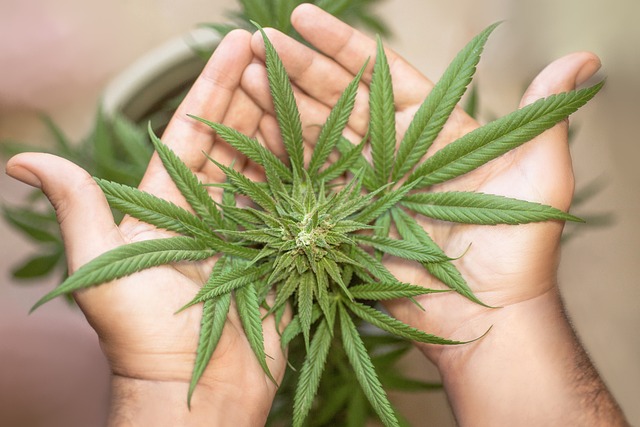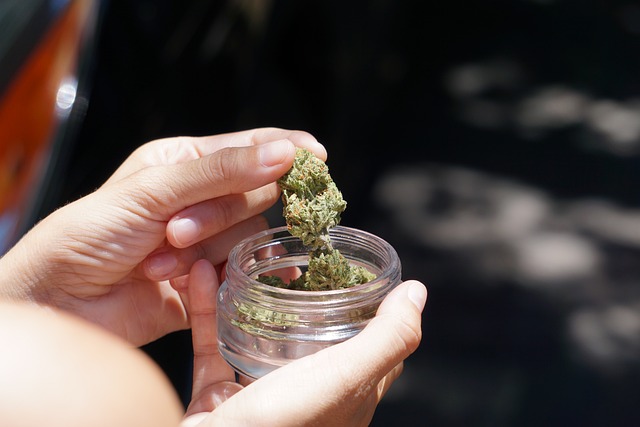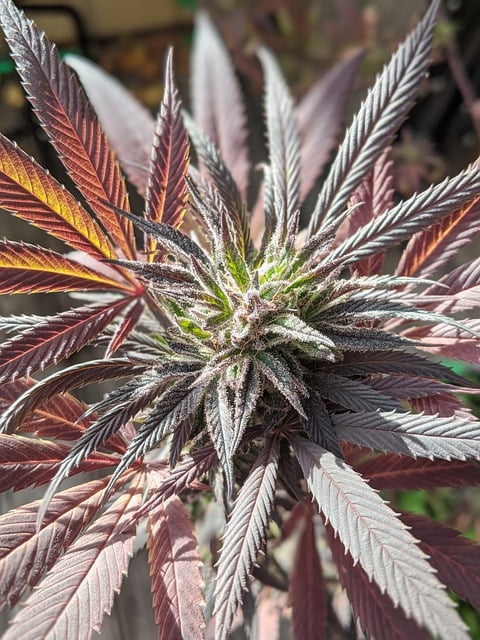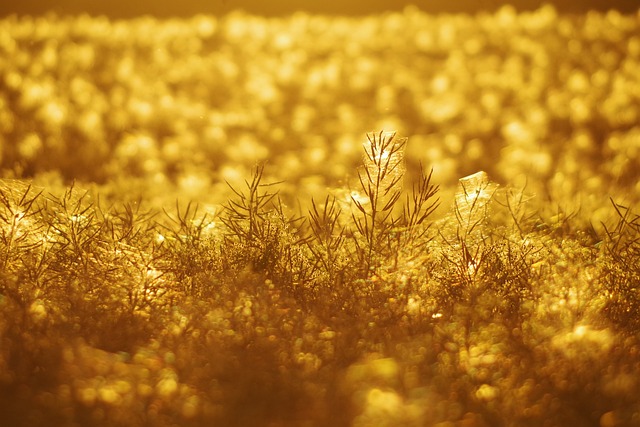2023 has seen THCA (tetrahydrocannabinolic acid), a non-psychoactive cannabinoid, gain recognition for its therapeutic potential in Arkansas, where it is legally recognized under the state's medical marijuana program. Recognized for its anti-inflammatory and analgesic properties, THCA is available to residents with a valid healthcare provider recommendation, adhering to the regulations set forth by the Arkansas Medical Marijuana Act of 2016. It's crucial for consumers to source THCA flower from licensed dispensaries to ensure quality, potency, and safety. While THCA is not psychoactive, it can induce mild effects similar to THC. Consumers should consult healthcare professionals before use, particularly if they have pre-existing health conditions or are on other medications. Legal updates regarding THCA must be monitored as state laws evolve, with the Arkansas Department of Health providing the most recent information. THCA's legal status in Arkansas, where it is considered legal, is defined within the medical cannabis program, emphasizing the importance of compliance for consumers. As research continues to support its potential health benefits, awareness and education about THCA remain vital for informed use within the state's legal framework.
Exploring the multifaceted nature of THCA (Tetrahydrocannabinolic Acid) flower, this article serves as an informative guide for Arkansas residents intrigued by its burgeoning legal status and potential health benefits. Delving into the legality of THCA flower in Arkansas, we clarify where it stands under current laws. Understanding THCA’s role within the cannabis plant and its unique properties is crucial for those considering its use. This piece also examines the entourage effect, highlighting how THCA flower interacts with other cannabinoids to influence well-being. As we navigate through safety considerations, side effects, dosage, and interaction with other substances or medications, our focus remains on empowering readers with knowledge for safe consumption. Best practices for use and sourcing quality THCA flower are outlined, ensuring adherence to state regulations. Additionally, the article addresses the impact of terpenes on THCA’s effects, implications for medical patients, and the potential future role in Arkansas agriculture. Stay up-to-date with legislative changes affecting THCA’s legal standing in Arkansas, and find answers to common questions in our FAQ section. Join us as we provide a comprehensive overview of THCA flower and its place within the Natural State’s evolving cannabis landscape.
- THCA Flower: A Comprehensive Overview for Arkansas Residents
- The Legal Status of THCA Flower in Arkansas
- Understanding THCA and Its Potential Health Benefits
- The Entourage Effect: THCA Flower vs. Other Cannabinoids
- Safety Considerations and Side Effects of THCA Flower Consumption
THCA Flower: A Comprehensive Overview for Arkansas Residents

In recent years, interest in cannabinoids and their therapeutic potential has surged, leading to increased attention on THCA flower, particularly among residents of Arkansas. The legal landscape in Arkansas has evolved to include the medical use of cannabis and its derivatives, with THCA (Tetrahydrocannabinolic Acid) being one such compound that has garnered interest for its potential health benefits. Unlike its psychoactive counterpart THC (Tetrahydrocannabinol), THCA is non-psychoactive and is often favored for its medicinal properties, which include anti-inflammatory, neuroprotective, and analgesic effects. For Arkansans exploring cannabis-based treatments, understanding the nuances between different cannabinoids like THCA is crucial. It’s important to note the legality of THCA flower in Arkansas; while medical marijuana is legal under state law with a valid recommendation from a qualified healthcare provider, the specific forms and derivatives allowed may vary. Residents should be well-versed in the state’s regulations to ensure compliance with the law when considering THCA flower as part of their wellness regimen.
Before incorporating THCA flower into one’s health routine, it’s essential to consult with a healthcare professional, especially given its interactions with other medications and potential side effects. While the compound is generally considered safe for therapeutic use by state regulations, individual experiences may vary, and proper dosing and administration are key to maximizing benefits while minimizing risks. For those in Arkansas looking to explore THCA flower as a supplement to their health regimen, it’s important to source from licensed dispensaries to ensure the product’s quality, potency, and safety. With a growing body of research supporting the potential therapeutic applications of cannabinoids like THCA, Arkansans have access to a range of options that may aid in managing various health conditions. However, staying informed about the evolving legal status of different cannabis compounds is vital for adhering to state laws and making informed decisions about their use.
The Legal Status of THCA Flower in Arkansas

In the context of Arkansas’ legislative framework, the legal status of THCA flower has been a subject of ongoing dialogue and regulation. As of the knowledge cutoff in 2023, medical marijuana, which includes derivatives such as THCA, is legally permissible under the Arkansas Medical Marijuana Act passed in 2016. However, it’s crucial for consumers to obtain THCA flower from licensed dispensaries within the state, as possession of cannabis outside of these regulated channels can lead to legal consequences. The Act established a structured system for the cultivation, processing, and sale of medical marijuana, with clear guidelines for patients who have received a recommendation from a certified physician. This regulatory framework ensures that THCA flower, when used medicinally by qualified patients, adheres to state law. Patients in Arkansas can legally possess up to 2.5 ounces of marijuana in usable form, which includes THCA flower, and are protected under state law so long as they comply with the regulations set forth by the state’s medical marijuana program. It’s important for consumers to stay updated on any changes to these laws, as the legal landscape regarding cannabis can evolve rapidly. Always refer to the latest updates from the Arkansas Department of Health for the most current information on THCA flower’s legal status and usage within the state.
Understanding THCA and Its Potential Health Benefits

Cannabidiolic acid (THCA) is a non-psychoactive cannabinoid found naturally in the cannabis plant, which has garnered attention for its potential health benefits. As of my knowledge cutoff in early 2023, THCA is legal in Arkansas under certain conditions, aligning with federal and state regulations that distinguish between THC (the psychoactive form) and its precursor THCA. Research suggests that THCA may offer a range of therapeutic properties without the high associated with its decarboxylated form, THC. Studies have indicated that THCA could potentially alleviate pain, inflammation, and nausea, and it may also exhibit neuroprotective qualities. Its anti-inflammatory effects are particularly noteworthy, as they could be beneficial for conditions like arthritis and other inflammatory diseases. Additionally, THCA’s interaction with the endocannabinoid system has been observed to influence various physiological processes, including immune response modulation, suggesting a broad spectrum of potential wellness applications. As legal frameworks continue to evolve, understanding the distinctions between different cannabinoids and their legal status, such as THCA being legal in Arkansas, is crucial for individuals exploring cannabis-based treatments for various health conditions.
The Entourage Effect: THCA Flower vs. Other Cannabinoids

When exploring the potential side effects of THCA flower, understanding the entourage effect can provide valuable context. The entourage effect refers to the synergistic interactions between cannabinoids and other components within the cannabis plant, such as terpenes and flavonoids, which can influence the effects experienced by users. THCA, or tetrahydrocannabinolic acid, is one of the many cannabinoids found in the Cannabis sativa plant and is non-psychoactive. When heated, it decarboxylates into THC, the primary psychoactive component of cannabis. In the context of THCA legal in Arkansas, users have access to the raw flower form of this cannabinoid, which can offer distinct benefits compared to its psychoactive counterpart.
The presence of THCA in a cannabis flower, as opposed to other cannabinoids like CBD (cannabidiol) or CBN (cannabinol), affects the overall effect profile. THCA is known for its potential anti-inflammatory and analgesic properties without the psychoactive high associated with THC. This makes it a valuable option for those seeking relief from certain conditions without impairment. The entourage effect also suggests that THCA may interact differently with the body’s endocannabinoid system compared to other cannabinoids, potentially leading to unique side effects or experiences. For instance, some users may experience mild psychoactive effects when consuming THCA flower, although these are generally less pronounced than those from THC. In Arkansas, where THCA is legal, consumers can experiment with this cannabinoid’s effects and explore its potential benefits within the confines of the law. It’s important to note that while the entourage effect can enhance the therapeutic properties of cannabis, individual responses may vary, and further research is needed to fully understand the spectrum of side effects associated with THCA flower consumption.
Safety Considerations and Side Effects of THCA Flower Consumption

THC acid, known as tetrahydrocannabinolic acid (THCA), is a non-psychoactive compound found in hemp and cannabis plants. As interest in CBD products has grown, so has curiosity about other cannabinoids like THCA, particularly regarding its potential therapeutic effects and legal status. In Arkansas, where the medical cannabis program is regulated and THCA is present in many strains, consumers should be aware of safety considerations and potential side effects when using THCA flowers. While THCA is non-psychoactive, it’s a precursor to THC, which means that some of its effects may be similar, though less pronounced. Users should start with low doses to gauge their individual reactions, as THCA can cause adverse effects in certain individuals, such as drowsiness, dry mouth, and decreased blood pressure, particularly when consumed in high quantities. It’s also important to note that the legal status of THCA flowers in Arkansas is contingent on state regulations, which allow for the use of medical cannabis products containing THCA, provided they are obtained from licensed dispensaries and used within the confines of the law. Users must adhere to these regulations to ensure safe and legal consumption. Additionally, while THCA has been associated with anti-inflammatory and neuroprotective properties, more research is needed to fully understand its effects and safety profile. Consumers should consult with healthcare professionals before incorporating THCA flowers into their wellness regimen, especially if they have underlying health conditions or are taking other medications.
Arkansas residents considering incorporating THCA flower into their wellness routine should be well-informed about its legal status, potential health benefits, and the entourage effect it presents compared to other cannabinoids. As outlined in this article, THCA is legally permissible in Arkansas under certain conditions, making it accessible for those interested within the confines of state law. While THCA is often associated with various therapeutic properties, it’s crucial to understand that like all substances, it can induce side effects. Common adverse reactions may include dizziness, lethargy, or mild psychoactive effects, which are typically mild but should be carefully monitored, especially for new users. A thorough understanding of THCA flower’s impact on individual health is essential, and it’s always recommended to consult with a healthcare professional before use. In light of the comprehensive overview provided, residents can make informed decisions about whether THCA flower fits into their health regimen while adhering to local laws.
